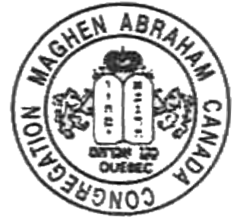M A Information - MARDI 2 SEPT 530pm BBQ ANNUEL DE MAGHEN ABRAHAM
08/26/2025 08:26:34 PM
| Author | |
| Date Added |
|
|
|
|
|
|
|
|
|
|
|
|
|
|
|
|
|
|
|
|
M A Information : Let's Honour the Hazkara of [yahrzeit_deceased] z'L toghether
08/26/2025 12:29:00 AM
| Author | |
| Date Added |
|
|
|
|
|
|
|
|
|
|
|
|
|
|
|
|
|
|
|
|
Sun, August 31 2025
7 Elul 5785
Update this content.
Join Our Mailing List
Today's Calendar
| Rosh Chodesh Tammuz |
This week's Torah portion is Parshat Chukat
| Shabbat, Jul 13 |
Candle Lighting
| Friday, Jul 12, 8:22pm |
Habdalah
| Motzei Shabbat, Jul 13, 9:36pm |
Rosh Chodesh Tammuz
| Sunday, Jul 7 |
Update this content.
Update this content.
at Maghen Abraham
Friday Night
| Minha : 6:00pm |
| Candle Lighting : 8:22pm |
Shabbat Day
| Shaharit : 9:00am |
| Minha : 7:41pm |
| Habdalah : 9:36pm |
Update this content.
Mishmara / Yahrzeit
No lifecycles today
Update this content.
For Aliya Reservation Pour Réservation de Aliya
Shabbat Kiddush Sponsorship Parrainage Kiddouch de Shabbat
Membership / Adhésion
Zmanim
| Alot Hashahar | 4:40am |
| Earliest Talit - Tefilin | 5:18am |
| Sunrise | 6:14am |
| Latest Shema | 9:34am |
| Zman Tefillah | 10:41am |
| Hatsot (Mid-Day) | 12:54pm |
| Minha Gedola | 1:28pm |
| Minha Ketana | 4:48pm |
| Plag HaMincha | 6:11pm |
| Sunset | 7:34pm |
| Nightfall | 8:20pm |
| More >> | |
Update this content.
Update this content.
Privacy Settings | Privacy Policy | Member Terms
©2025 All rights reserved. Find out more about ShulCloud






